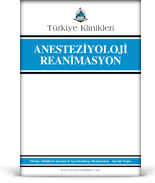Amaç: Bu çalışma, aşılama programının başlaması öncesinde Karaman Eğitim Araştırma Hastanesinin koronavirüs hastalığı-2019 [coronavirus disease-2019 (COVID-19)] hastalarının tedavi gördüğü yoğun bakımlarında çalışmakta olan sağlık personellerinden çalışma için gönüllü olanların COVID-19 aşıları hakkındaki görüş ve tutumlarının değerlendirilmesi amacıyla yapılmıştır. Gereç ve Yöntemler: Bu çalışma, Türkiye'de COVID-19 aşılama programının başlamasından önceki hafta Karaman Eğitim Araştırma Hastanesinde 3. basamak yoğun bakım çalışanlarına ait demografik özellikler ve COVID-19 aşılarıyla ilgili sorulan 20 soruya, alınan cevapların anket formlarına kaydedildiği, tanımlayıcı tipte bir çalışmadır. Bulgular: Çalışmaya COVID-19 hastalarının tedavi görmekte olduğu yoğun bakımlarda çalışan 94 yoğun bakım personelinden gönüllü olan 77 (%81,2) sağlık çalışanı dâhil edildi. Katılımcıların %63,6'sı (n=49) kadın ve %36,4'ü (n=28) erkek idi. Katılımcıların %49,4'ü (n=38) 20-29 yaş, %29,9'u (n=23) 30-39 yaş, %19,5'i (n=15) 40-49 yaş ve %1,3'ü (n=1) 50 yaş üzeri idi. Katılımcıların %50,6'sı (n=39) aşı olmayı düşündüğünü, %29,9'u (n=23) aşı olmayı düşünmediğini ve %19,5'i (n=15) ise kararsız olduğunu belirtti. Sonuç: Sonuç olarak, aşı kabulünde aile ve yakınlarını koruma düşüncesi, salgının kendiliğinden bitmeyeceği düşüncesi ve şu an için aşıdan daha etkili bir korunma yolunun olmaması düşüncesi etkili gibi görülmektedir. Aşı reddi veya kararsızlığında ise; aşının etkinliğine güvensizlik, aşının hızlı üretimine olan güvensizlik, yan etki olabileceği düşüncesi, salgının kendiliğinden biteceği düşüncesi etkili olmaktadır. Çalışmamızın sonuçlarında ortaya çıkan aşı konusunda, tereddütlere sahip olan kararsız grubun nitelikli bilgilendirmeyle tereddütlerinin ortadan kalkabileceği düşünülmektedir. Böylece hem sağlık personelleri korunmuş olacak hem de sağlık sisteminin sürdürülebilirliği sağlanmış olacaktır.
Anahtar Kelimeler: COVID-19; pandemi; COVID-19 aşıları; sağlık personeli
Objective: This study was conducted to evaluate the opinions and attitudes of coronavirus disease-2019 (COVID-19) Intensive Care Units health workers of Karaman Training and Research Hospital before the COVID-19 vaccination program started. Material and Methods: This is a descriptive study consist of answers to twenty questions asked about COVID-19 vaccines of the 3rd level intensive care staff at Karaman Training and Research Hospital before the start of the COVID-19 vaccination program in Turkey. Results: The study included 77 (%81,2) healthcare workers who volunteered from 94 intensive care personnel working in intensive care units where COVID-19 patients were being treated. 63.6% (n=49) of the participants were female and 36.4% (n=28) were male. 49.4% (n=38) of the participants were 20-29 years old, 29.9% (n=23) 30-39 years old, 19.5% (n=15) 40-49 years old and % 1.3 of them (n=1) were over 50 years old. 50.6% (n=39) of the participants stated that they were considering getting vaccinated, 29.9% (n=23) were not considering getting vaccinated, and 19.5% (n=15) were undecided. Conclusion: As a result, the idea of protecting family and relatives, the idea that the epidemic will not end by itself, and the idea that there is no more effective way of protection than vaccines seem to be effective in vaccine acceptance. In case of vaccine rejection or hesitancy; insecurity in the vaccine's effectiveness, distrust in the rapid production of the vaccine, the thought that there may be side effects, the thought that the epidemic will end by itself is effective. It is thought that vaccine hesitancy can be eliminated with qualified information. Thus, both health personnel will be protected and the sustainability of the health system will be ensured.
Keywords: COVID-19; pandemic; COVID-19 vaccines; health personnel
- Kaur SP, Gupta V. COVID-19 Vaccine: A comprehensive status report. Virus Res. 2020;288:198114. [Crossref] [PubMed] [PMC]
- Rawat K, Kumari P, Saha L. COVID-19 vaccine: A recent update in pipeline vaccines, their design and development strategies. Eur J Pharmacol. 2021;892:173751. [Crossref] [PubMed] [PMC]
- Troiano G, Nardi A. Vaccine hesitancy in the era of COVID-19. Public Health. 2021;194: 245-51. [Crossref] [PubMed] [PMC]
- Tılıç L, Uz Özcan H. An analysis on the anti-vaccination movement in Turkish digital platforms: Ekşisözlük and Facebook. ESTÜDAM Halk Sağlığı Dergisi. 2021;6(1):1-10. [Link]
- Murphy J, Vallières F, Bentall RP, Shevlin M, McBride O, Hartman TK, et al. Psychological characteristics associated with COVID-19 vaccine hesitancy and resistance in Ireland and the United Kingdom. Nat Commun. 2021;12(1):29. [Crossref] [PubMed] [PMC]
- Dror AA, Eisenbach N, Taiber S, Morozov NG, Mizrachi M, Zigron A, et al. Vaccine hesitancy: the next challenge in the fight against COVID-19. Eur J Epidemiol. 2020;35(8):775-9. [Crossref] [PubMed]
- Kwok KO, Li KK, Wei WI, Tang A, Wong SYS, Lee SS. Editor's Choice: Influenza vaccine uptake, COVID-19 vaccination intention and vaccine hesitancy among nurses: A survey. Int J Nurs Stud. 2021;114:103854. [Crossref] [PubMed] [PMC]
- Niu S, Tian S, Lou J, Kang X, Zhang L, Lian H, et al. Clinical characteristics of older patients infected with COVID-19: A descriptive study. Arch Gerontol Geriatr. 2020;89:104058. [Crossref] [PubMed] [PMC]
- Ing EB, Xu QA, Salimi A, Torun N. Physician deaths from corona virus (COVID-19) disease. Occup Med (Lond). 2020;70(5):370-4. [Crossref] [PubMed] [PMC]
- Ranney ML, Griffeth V, Jha AK. Critical Supply Shortages -The Need for Ventilators and Personal Protective Equipment during the Covid-19 Pandemic. N Engl J Med. 2020;382(18): e41. [Crossref] [PubMed]
- Sallam M. COVID-19 Vaccine Hesitancy Worldwide: A Concise Systematic Review of Vaccine Acceptance Rates. Vaccines (Basel). 2021;9(2):160. [Crossref] [PubMed] [PMC]
- Di Gennaro F, Murri R, Segala FV, Cerruti L, Abdulle A, Saracino A, et al. Attitudes towards Anti-SARS-CoV2 Vaccination among Healthcare Workers: Results from a National Survey in Italy. Viruses. 2021;13(3):371. [Crossref] [PubMed] [PMC]
- Khubchandani J, Sharma S, Price JH, Wiblishauser MJ, Sharma M, Webb FJ. COVID-19 Vaccination Hesitancy in the United States: A Rapid National Assessment. J Community Health. 2021;46(2):270-7. [Crossref] [PubMed] [PMC]
- Qunaibi E, Basheti I, Soudy M, Sultan I. Hesitancy of Arab Healthcare Workers towards COVID-19 Vaccination: A Large-Scale Multinational Study. Vaccines (Basel). 2021;9(5): 446. [Crossref] [PubMed] [PMC]
- Soares P, Rocha JV, Moniz M, Gama A, Laires PA, Pedro AR, et al. Factors Associated with COVID-19 Vaccine Hesitancy. Vaccines (Basel). 2021;9(3):300. [Crossref] [PubMed] [PMC]
- The Lancet. COVID-19: protecting health-care workers. Lancet. 2020;395(10228):922. [Crossref] [PubMed] [PMC]
- Jeyanathan M, Afkhami S, Smaill F, Miller MS, Lichty BD, Xing Z. Immunological considerations for COVID-19 vaccine strategies. Nat Rev Immunol. 2020;20(10):615-32. [Crossref] [PubMed] [PMC]







.: Process List